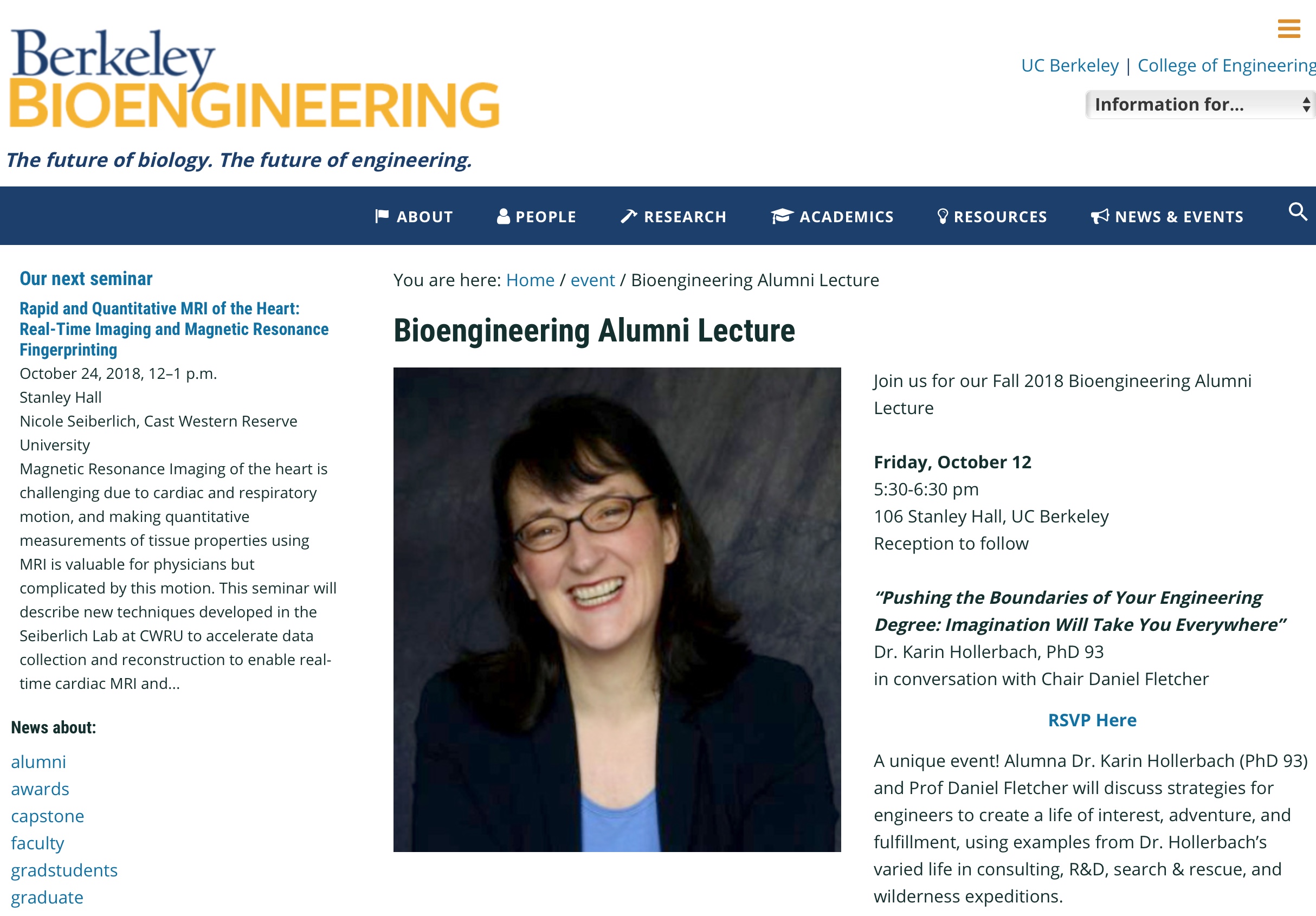Homecoming at UC Berkeley
Last week, for the Homecoming Weekend at UC Berkeley, I was invited by the Bioengineering Department to give a talk entitled “Pushing the Boundaries of Your Engineering Degree – Imagination Will Take You Everywhere.” I really enjoyed this opportunity to visit the campus and to speak with faculty and students – thank you, Prof Dan Fletcher, Department Chair (also an alum of this very same program), for inviting me!
Because imagination was a core part of the theme, we felt free to experiment with format and did an on-stage interview / conversation rather than a presentation. This freed us up to touch on many interesting topics, rather than solely delving into the details of one particular research or engineering project or one particular aspect of my career.
I’ve always been interested in cross-cutting, interdisciplinary topics, melding biology and science with engineering and computing and applying fundamental problem-identification and problem-solving techniques across a variety of application areas, and guiding people with diverse backgrounds to come together in interdisciplinary teams. That used to be considered weird but not anymore. After all, things like AI, robotics, automation and other technologies are touching on virtually all aspects of our working and in many cases our personal lives. Certainly in my current role at Presque, we’re using physics, engineering, embedded systems, machine learning, and other techniques and applying them to health and wellness challenges – who knew some day I’d be involved in a breastfeeding related project?
Common Threads
One of the reasons I enjoyed our discussion format was because we could talk about themes that have created a common thread throughout my career.
On the science / technology side, what interests me are technologies that are enablers for so many sectors. I’ve already mentioned several. To me, these are as fundamental and as enjoyable as something like mathematics, which underpins pretty much everything.
Too much imagination in one’s career can also lead to not having a coherent theme… and over time I’ve developed a clear set of metrics as to what I look for in determining how to spend my time, including professional and volunteer time. This has allowed me to maximize creativity, innovation and imagination while limiting the pursuit of “shiny objects” that don’t really further my core purpose in life.
Metrics
These metrics seem surprising to some: service, happiness and selfishness. Really?
Service to me means whether or not I can be of service to others. At some level, that’s true with any job one takes – no one would hire you for a particular job if you couldn’t produce something useful in that job. I like to think about it more deeply – is something I’m considering truly lined up with my skills and talents and is it the best way in which I can make a contribution that is actually meaningful and creating shareable value?
Furthermore, particularly when I think about management, how well does a position enable me to inspire others and help them to maximize their contributions? Maybe it’s not a huge surprise if I say I’m particularly interested in inspiring women and girls to reach into areas in which they have been unrepresented and may find roadblocks, on the job and off the job.
Happiness
Happiness seems to be frequently neglected in people’s paying work. I’m not naïve; I realize that not everyone has the choices and options available to them that I have. But the folks in this audience – undergraduates and graduate students at one of the world’s most prestigious engineering universities – yes, they do have choices. It’s up to them to make the best of them. My aikido sensei has said repeatedly, it has to be fun. Meaning, for anything that takes as much dedication and commitment as a career (or a lifelong martial arts practice), if you’re not deriving happiness, it’s probably not going to last, and you certainly won’t be at your best doing it.
There are a lot of things I could get paid for because they need doing and because I’m good at them – but if I don’t actually enjoy them, it’s not a good long-term match. (Of course, in the short term sometimes even unpleasant things need to just get done.) We all too often feel trapped by demands on our time and skills, and I find saying “no” to opportunities to be a wonderful thing. This requires daily vigilance and recommitment.
On the flip side, challenging myself and growing my skills (mentally and physically) inherently is enjoyable and provides happiness for me, so saying “yes”, especially if something scares me, is equally wonderful and has led to many rewarding projects and experiences – e.g., taking on my first CEO job; agreeing to write a chapter in a book in German, at a time when my business and technical German was not that well developed yet; expanding my airplane flying skills; more recently diving back into an early stage startup requiring that my engineering skills remained sharp rather than comfortably remaining in my previous engineering and general management position! 
What about selfishness?
To many that seems a “bad” thing. To me, bad versions of selfishness are when it’s all about ME, ME, ME. However, good selfishness is really about ensuring that I get what I need out of situations – in order to sustain me and to enable me to continue to make contributions and be of service on a long-term basis. It can be as straightforward as – am I getting paid adequately for what I’m contributing? More interestingly, it is identifying what nourishes me and enables me to be fully healthy and present in the long term.
One of the slides* I brought with me was one of my favorite quotes from Audre Lorde, which I hadn’t thought about as being part of the my definition of selfishness until one of the astute students in the audience piped up and asked about it. He was absolutely right – self-indulgence, maybe not so good; self-care, you bet!
Imagination
So where have my imagination and application of these metrics taken me? I’ve said no to things that seemed sound but where I simply couldn’t understand how I could provide service in some fundamentally meaningful (to me) way, and create true value, not what I jokingly refer to as “just another app.” I have nothing against apps, honest! They just need to solve some truly meaningful problem for me to get interested.
 On the positive side, imagination has led me to countries all over the world (although I am still looking for that project in Antarctica…) – including my latest efforts to combine my climbing trip (what started off as a vacation) to Aconcagua with the opportunity to make a meaningful science/engineering contribution.
On the positive side, imagination has led me to countries all over the world (although I am still looking for that project in Antarctica…) – including my latest efforts to combine my climbing trip (what started off as a vacation) to Aconcagua with the opportunity to make a meaningful science/engineering contribution.
Whacky? Possibly! Unusual? Definitely. With imagination, I’m working hard with my collaborators to create a structure that works, between me as an individual and organization/s not used to such collaborations. Meeting all of my key metrics and creating an opportunity to do something amazing? Absolutely!
*Image adapted from a public domain image as noted.





Leave A Comment